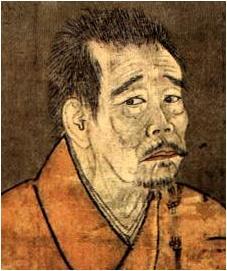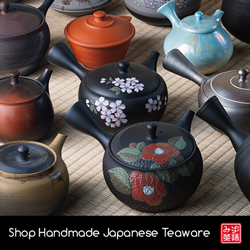
The Buddhist monk Ikkyū Sōjun (一休宗純) is credited for imparting a Zen influence into the arts of Japan.
Of course, this includes Japanese tea.
Ikkyū’s disciple, Murata Jukō, would become the founder of the Japanese tea ceremony.
Ikkyū taught Jukō that Zen is also present when preparing tea.
The life of a significant figure in Zen history
Ikkyū was born in Kyoto. The year was 1394.
His father was the emperor Go Komatsu (後小松天皇), but unfortunately Ikkyū had been the result of an affair with a noble courtwoman.
His mother had to leave the imperial court in order to give birth to Ikkyū.
She also wanted to protect her son from the political strife, so when Ikkyū was five years old she sent him to Ankoku temple (安国寺) in Kyoto to become an acolyte.
Ankoku temple belonged to the Rinzai school of Zen Buddhism. Note that Myōan Eisai, who brought this school of Zen into Japan, is known as the father of Japanese tea culture.
By the age of thirteen, Ikkyū had published his first book of Chinese poetry. In the following years he would have a good reputation as a poet.
When Ikkyū was sixteen, he became a disciple of high priest Kenou Soi (謙翁宗為) in order to further his Zen studies.
Unfortunately, Kenou passed away four years later. Ikkyū felt such sorrow that he attempted suicide by drowning himself, but was rescued in time.
A year later, he went to Daitoku temple (大徳寺) to study under Zen monk Kasō Sōdon (華叟宗曇).
In the year 1420 (Ikkyū was 26 by then), while meditating on a boat in Lake Biwa he reached enlightenment. Kasō confirmed it and gave him a certificate.
For the next years Ikkyū showed his eccentric side, which is one reason why he is now famous.
Ikkyū did most of what was prohibited to Buddhist monks. He drank wine, ate meat, didn’t shave, frequented brothels, among other things, but still linked his actions to Zen.
He was a critic of the hypocrisy that he saw in other priests, and preferred to live as a vagabond.
By this time he was also a famous poet, painter, and calligraphy master. He was very influential in the Zen arts of the Muromachi period.
When he was 47, he burned his certificate of enlightenment to ashes.
Ten years later there was a factional dispute in Daitoku temple. The result was several monks being imprisoned, and one of them committed suicide.
Ikkyū was so depressed with the degradation of the temple that he sought to take his own life once again. This time he decided to die of starvation, but was convinced otherwise after reading a letter written by the emperor himself.
Ikkyū went as far as having an open relationship with a woman: a blind singer named Shinjisha (森侍者). They had a son later on.
In 1474, when Ikkyū was 80 years old, Daitoku temple was burned down because of the Onin war. The emperor of the time appointed Ikkyū as the 47th abbot of the temple.
Coming back to the subject of tea, Daitoku temple has always been known as a center of the tea ceremony. Many great tea masters come from there, including Sen no Rikyū.
The reconstruction of the temple would take five years. The fame of Ikkyū was instrumental in receiving the necessary funds.
He died from malaria when he was 87. His last words were “I don’t want to die”, which was totally unexpected from an enlightened monk, but it fits Ikkyū’s character.






May 2, 2017
ah what an incredible story, very refreshing ! I like it that he burnt a certificate of enlightenment, lol !
May 2, 2017
Thank you Rita. It is definitely a different story compared to other Buddhist monks 🙂
May 7, 2017
This is so interesting. Great job!
May 7, 2017
Thank you for your kind comment Rona.
October 1, 2019
He brought enlightenment to his certificate for sure
October 1, 2019
Definitely 🙂